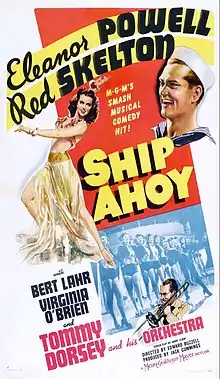Ship Ahoy
Ship Ahoy is a 1942 musical-comedy film directed by Edward Buzzell and starring Eleanor Powell and Red Skelton. It was produced by MGM.
| Ship Ahoy | |
|---|---|
 Theatrical poster | |
| Directed by | Edward Buzzell |
| Produced by | Jack Cummings |
| Screenplay by | Harry Clork Irving Brecher (uncredited) Harry Kurnitz (uncredited) |
| Story by | Matt Brooks Bradford Ropes Bert Kalmar |
| Starring | Eleanor Powell Red Skelton Bert Lahr Virginia O'Brien |
| Music by | George Bassman George Stoll |
| Cinematography | Robert H. Planck Leonard Smith Clyde De Vinna |
| Edited by | Blanche Sewell |
Production company | MGM |
| Distributed by | Metro-Goldwyn-Mayer |
Release date |
|
Running time | 95 mins. |
| Country | United States |
| Language | English |
| Budget | $1,037,000[1] |
| Box office | $2,507,000[1] |
Background
Ship Ahoy was the first of two films in which Powell and Skelton co-starred. It is considered a lesser effort on both actors' behalf, however the film is chiefly remembered today for including Frank Sinatra, who appears in an uncredited performance as a singer with the Tommy Dorsey Orchestra. The movie also is credited with one of the most unusual displays of dance on screen for a sequence in which Powell's character, needing to communicate a message to a (real) US agent in the audience of one of her shows, manages to tap out the message in morse code. (Reportedly, Powell taps genuine code during the performance.)
Skelton and Powell next paired up in 1943's I Dood It. In that film, they appeared with Jimmy Dorsey, Tommy's brother.
Plot
Tallulah Winters is a dancing star who is hired to perform on an ocean liner. Before she leaves, she is recruited by what she believes is a branch of the American government and asked to smuggle a prototype explosive mine out of the country. In fact, she is unknowingly working for Nazi agents who have stolen the mine. Meanwhile, Merton Kibble (Red Skelton), a writer of pulp fiction adventure stories but suffering from severe writer's block, is on the same ship and soon he finds himself embroiled in Tallulah's real-life adventure. Also appearing in the film were Bert Lahr, Tommy Dorsey, Buddy Rich, and Virginia O'Brien.
Cast
- Eleanor Powell as Tallulah Winters
- Red Skelton as Merton K. Kibble
- Bert Lahr as "Skip" Owens
- Virginia O'Brien as Fran Evans
- William Post Jr. as H. U. Bennett
- James Cross as "Stump"
- Eddie Hartman as "Stumpy"
- Stuart Crawford as Art Higgins
- John Emery as Dr. Farno
- Bernard Nedell as Pietro Polesi
- Tommy Dorsey as Himself
- Frank Sinatra as Himself
- Buddy Rich as Himself
- Ziggy Elman as Himself
- Moroni Olsen as Inspector Davis
- George Watts as Hotel detective
- Ralph Dunn as Flammer
- William Tannen as Grimes
Reception
According to MGM records the film earned $1,831,000 at the US and Canadian box office and $676,000 elsewhere, making the studio a profit of $1,037,000.[1][2]
References
- The Eddie Mannix Ledger, Los Angeles: Margaret Herrick Library, Center for Motion Picture Study.
- "101 Pix Gross in Millions" Variety 6 Jan 1943 p 58
